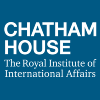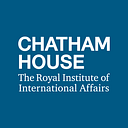The Week at Chatham House: Hard vs. Soft Brexit, America Under Trump and Turmoil in the Middle East
For this end-of-year edition, read some of the highlights in international affairs from the past year at Chatham House.
‘Hard’ Brexit, ‘Soft’ Brexit or ‘Sensible’ Brexit?
There were lots of twists and turns in the Brexit debate this year, from the UK government’s formal triggering of Article 50 of the Treaty on European Union to remove Britain from the EU in March, to the shock snap UK general election result which saw Prime Minister Theresa May lose her majority in the House of Commons and form a minority government with Northern Ireland’s Democratic Unionists Party, to MPs voting against May in support of an amendment to the EU Withdrawal Bill, promising them a decisive vote on any final deal with the EU.
Chatham House welcomed former Belgian prime minister, Guy Verhofstadt, who spoke about the danger of identity politics in the Brexit debate, while former president of the European Council, Herman Van Rompuy mused on how Brexit will affect the UK’s European neighbours. Former UK prime minister, John Major, also warned against the kind of populism seen in the EU referendum campaigns, while former European commissioner for trade, Pascal Lamy, spoke in an interview about his disappointment in seeing the UK become the first nation to leave the EU after almost 44 years of membership.
The Labour Party also made their cases for how Britain should steer its foreign policy course after Brexit. Labour leader Jeremy Corbyn outlined why there should be ‘no more hand-holding with Donald Trump’ as he outlined his key defence, security and foreign policy positions, while shadow secretary of state for exiting the EU, Keir Starmer, spelled out his vision for Britain’s post-Brexit place in the world, and Chuka Umunna argued why Brexit confronts Britain with profound questions which it hasn’t had to face since the Suez Crisis in 1956.
Brussels also had its say as Stefaan De Rynck, senior adviser to EU chief negotiator Michel Barnier, offered his insights into the progress made so far in negotiations between the UK and the EU and the key challenges still to be overcome. Chatham House Director, Robin Niblett, rounded off the debate by arguing why although a ‘soft’ Brexit might be a good economic outcome for the UK, it is not politically viable: instead, a ‘sensible’ Brexit — which retains the best possible levels of access to the EU’s single market but secures the return of sovereign rights — is the best way forward.
Trump’s America
It has been almost a year since Donald Trump took office after securing the world’s top job following his win in the US presidential election in 2016. Since coming to power, there have been several flashpoints in the president’s relations with the world, from minor disputes with Sweden to major clashes with North Korea.
In September’s issue of International Affairs, attention was on the implications of the Trump presidency for US foreign policy. Peter Dombrowski and Simon Reich asked whether Trump could have a grand strategy in mind and also whether it was possible for any US president to pursue a grand strategy in a multipolar 21st century. Elsewhere Doug Stokes and Kit Waterman examined US strategic concerns in East Asia, while James Hannah, writing in The World Today, examined how the president intends to handle China.
Former US secretary of state, John Kerry, also spoke at Chatham House criticizing the US president over his decision to decertify the Iran nuclear deal, two years after it was negotiated between the P5+1 and Iran.
Gender Equality
It has been a significant year for gender issues which included seeing Saudi Arabia give the green light for women to attain driving licences. Former White House lead on women and girls, Tina Tchen, sat down at Chatham House to discuss the importance of gender diversity in driving global economic growth in a century where more women than men are living in poverty. Chatham House also organized its annual #SheCanWeCan competition and has been working closely with countries hosting the G20 as part of its Gender and Growth Initiative to ensure gender issues are included in discussions over economic growth targets.
Furthermore, the latest issue of The World Today takes a look at the apparent ‘crisis in masculinity’ examining how men are — and are not — coping with technological, geopolitical, religious & other systemic & historical changes that are disrupting old gender hierarchies & social structures.
Instability in the Middle East
The fight against ISIS took a turn this year, with Iraq announcing that the terrorist group has seemingly been defeated. Barrister, Amal Clooney, joined United Nations High Commissioner for Human Rights, Zeid Raad Al Hussein, and German Federal Public Prosecutor, Christian Ritscher, to discuss alleged war crimes, crimes against humanity and genocide committed in Iraq and Syria by ISIS, particularly against the Yazidi community.
Elsewhere, in the Gulf region, a boycott against Qatar stole the headlines. In an exchange of views at Chatham House, the Qatari foreign minister outlined Qatar’s response to the boycott orchestrated by several Arab countries including Saudi Arabia and the United Arab Emirates. In response, the UAE foreign affairs minister explained his country’s reasons for joining with Saudi Arabia, Bahrain and Egypt to take diplomatic actions against Qatar, while the Saudi foreign affairs minister insisted that the sanctions ‘are not about humiliating anyone’ but bringing peace to the Arab region. Analysing the state of the crisis, Peter Salisbury explains why the diplomatic rift between the tiny gas-rich nation and its neighbours threatens to expose the murkier side of British and US relations with the Gulf States.
Meanwhile, Donald Trump threatened to disrupt the fragile Middle East Peace Process by announcing his intention to recognize Jerusalem as Israel’s capital although the UN has since voted against the move. Last month, the Israeli leader, Benjamin Netanyahu, spoke at Chatham House about the embattled Middle East conflict in a wide-ranging conversation covering the history of relations between Israel and Palestine.
Russian Belligerence?
Russian president, Vladimir Putin, has continued to make the headlines whether over ongoing allegations of Russian interference in the 2016 US elections or over its annexation of Crimea and support for separatists in eastern Ukraine.
The Ukraine crisis has claimed more than 10,000 lives and forced 1.8 million people to flee their homes, and Ukrainian president Petro Poroshenko, spoke at Chatham House in April, outlining the challenges he sees ahead for the eastern European country.
A Chatham House report also looked at how, four years on from its Euromaidan Revolution, Ukraine is fighting for its survival as an independent and viable state. Read our ‘Five Things to Know About the Problems in Ukraine’.
From Zimbabwe to Germany
And finally, following a military takeover that saw the ousting of Zimbabwe’s wartime leader, Robert Mugabe, Emmerson Mnangagwa has become president of the southern African country, which appears to be experiencing an unprecedented convergence as traditional political, economic and social fault lines are beginning to be bridged, writes Knox Chitiyo. Alex Vines also takes a look at the extent of China’s influence in Zimbabwean affairs, which can be traced back to the end of the Liberation War in 1979.
Elsewhere in Bonn, Germany, the annual climate change negotiations took place, with the US and France taking the centre stage albeit for different reasons. In June, Donald Trump declared his intention to withdraw the US from the Paris climate change agreement, signed by more than 190 countries in 2015, and in response, French President Emmanuel Macron announced at the talks that he will take on the gap in funding that will be left by America’s withdrawal from the agreement. Rob Bailey spoke about how US states and cities are continuing to meet their green targets in spite of the Trump administration’s policy shift as well as the importance of agreeing a global ‘rulebook’ ahead of the talks next year.

